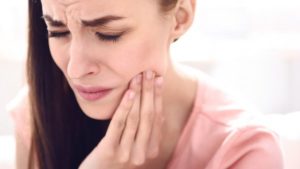Teeth Grinding (Bruxism)

Have questions about whether you are grinding your teeth or why teeth grinding happens? Our dentists took some time to share information and answer common patient questions to help educate about what happens when you grind your teeth. View the table of contents below to learn more or find your question and get an answer from one of our dentists!

The following content was provided by Dr. Michael DesRosiers, LVIF Certified General Dentist, and has been medically reviewed for accuracy. Some relevant links have been added to audio transcripts to provide resources for additional information.
Table of Contents:
Click a question below to be taken directly to that answer.
What is teeth grinding? What causes teeth grinding?
Answer provided by Dr. Michael DesRosiers. Transcript included below.
Dr. Michael DesRosiers:
There’s always been a discussion about grinding teeth, especially at night. We were told for most of our lives that it’s stress-related and things like that. And some people still do believe that that has a lot to do with it. There are a few different reasons that I believe that you grind your teeth. As young children, we found out now that we often are grinding our teeth to try to open our eustachian tube in our ear. We’re positioning our jaw in a certain ways that it makes things more patent.
As adults, in many cases, we’re actually grinding our teeth in order to posture our lower jaw more forward in order to open our airway. Because there’s so many people that have airway disease that they’re trying to basically keep air going into their body so they can breathe properly and oxygenate their tissues.
Other reasons, as we transition as children where we have some baby teeth and some permanent teeth, we do see grinding with some of those kids just because they just don’t have a stable bite and they’re trying to find that stable position. Same things with adults as we lose teeth. Sometimes, in the event that a tooth should crack or something like that, that will throw off and start grinding things. But largely, it’s a way to keep your lower jaw position forward to keep your airway patent, a protective mechanism.
How do I know if I grind my teeth at night?
Answer provided by Dr. Michael DesRosiers. Transcript included below.
Dr. Michael DesRosiers:
So there’s different ways to know if you grind your teeth or not. A lot of times when you come in for a dental appointment, the dentist can tell if you’ve been grinding your teeth a lot by the wear pattern on your teeth. Certain places where there should be rounded cusps, they’ll be flattened out or sharper.
Sometimes also at the gum line, there will be little areas called abfraction, which are a little wedge-shaped lesions right at the gum line, like little grooves that are worn in your teeth. The reason that that happens is we grind or clench our teeth and the teeth flex just a little bit over a lifetime at the gum line, back and forth in response to the force of the bruxism, and that actually wears away at that portion of the tooth. So it’s actually wears your tooth from getting that much pressure on them. But there are different signs that we look for in order to have the opinion that a patient is bruxing or clenching.
Other things, if you’re, if you’re married or if it’s a child that’s bruxing, somebody else usually can hear you doing it. So it’s amazing. The forces are very strong. It’s not typically something that you could consciously reproduce. So I have heard of parents that walked by their child’s bedroom door and could hear them from the hallway bruxing their teeth, or a spouse. So that’s something you definitely want to get checked out.
Can grinding my teeth at night give me a headache in the morning?
Answer provided by Dr. Michael DesRosiers. Transcript included below.
Dr. Michael DesRosiers:
Absolutely. So for a lot of reasons, grinding your teeth … You pit the teeth against one another, and they’re very strong tissues. Ultimately, something has to give and what typically is the first thing are muscles. So the headaches that arise, typically, you’ll find either will be in the close to the forehead area or in the very back of the head, are headaches of muscular origin. And so, what happens is the act of actually clenching or grinding your teeth together fatigues the muscles, the muscles get fatigued. And so, you start to have muscle pain, which is a headache.

